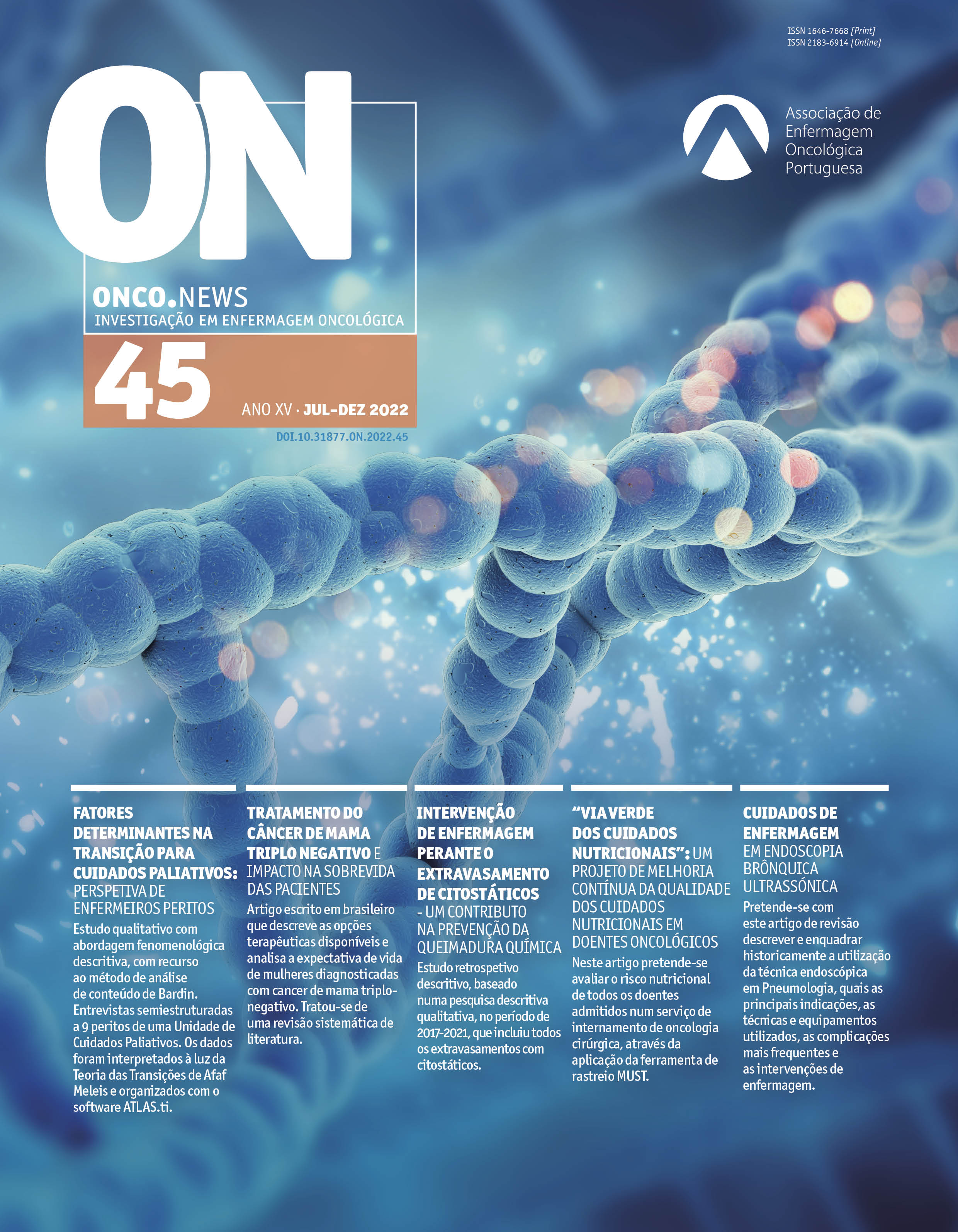"Green line of Nutritional Care”: a nutritional project for continuous improvement of the quality of cancer care
Keywords:
Malnutrition, Nutrition Assessment, Nutritional Status, Nutritional risk screening, NeoplasmsAbstract
Malnutrition is a common phenomenon in people with cancer. It can occur at all stages of the disease trajectory and its occurrence can have a significant negative impact on cancer treatment outcomes. With this project: “Via Verde dos Cuidados Nutricionais” (Green Line for Nutritional Care) we intend to assess the nutritional risk of all patients who were admitted to a surgical oncology inpatient service by applying the MUST screening tool (Malnutrition Universal Screening Tool). Depending on the scores obtained, patients are classified into low, medium or high risk of malnutrition. A descriptive longitudinal study was carried out in a public oncology hospital, tracking all patients on admission to the surgical oncology hospital.
A total of 160 patients were admitted, 20 were identified as being at medium risk and 16 patients at high risk, most of them had digestive pathology. The hospitalization had an average duration of 6.9 days, and an average weight loss but the end of 7 days of 1.76kg (t=5.084, p<0.001).
This project emphasizes the need for a structured and coordinated protocol for an early and effective nutritional intervention in cancer patients at medium and high risk of malnutrition. It also alerts to the need for intervention and proactive nutritional surveillance in patients who are not at risk, as this is not synonymous with the absence of potential future risk, particularly in patients with digestive pathology.
Downloads
References
Muscaritoli M, Arends J, Bachmann P, Baracos V, Barthelemy N, Bertz H, et al. ESPEN practical guideline: Clinical Nutrition in cancer. Clin Nutr. 2021;40(5):2898-913.
Muscaritoli M, Lucia S, Farcomeni A, Lorusso V, Saracino V, Barone C, et al. Prevalence of malnutrition in patients at first medical oncology visit: the PreMiO study. Oncotarget. 2017;8(45):79884-96.
Righini CA, Timi N, Junet P, Bertolo A, Reyt E, Atallah I. Assessment of nutritional status at the time of diagnosis in patients treated for head and neck cancer. Eur Ann Otorhinolaryngol Head Neck Dis. 2013;130(1):8-14.
Baracos VE, Martin L, Korc M, Guttridge DC, Fearon KCH. Cancer-associated cachexia. Nat Rev Dis Primers. 2018;4:17105.
Leiva Badosa E, Badia Tahull M, Virgili Casas N, Elguezabal Sangrador G, Faz Méndez C, Herrero Meseguer I, et al. Hospital malnutrition screening at admission: malnutrition increases mortality and length of stay. Nutr Hosp. 2017;34(4):907-13.
Argilés JM, Busquets S, Stemmler B, López-Soriano FJ. Cancer cachexia: understanding the molecular basis. Nat Rev Cancer. 2014;14(11):754-62.
Zhang X, Chen X, Yang J, Hu Y, Li K. Effects of nutritional support on the clinical outcomes of well-nourished patients with cancer: a meta-analysis. Eur J Clin Nutr. 2020;74(10):1389-400.
Enfermeiros Od, editor. Padrões de Qualidade dos Cuidados de Enfermagem – Enquadramento Conceptual, Enunciados Descritivos. Lisboa: Ordem dos Enfermeiros; 2011.
Stratton RJ, Hackston A, Longmore D, Dixon R, Price S, Stroud M, et al. Malnutrition in hospital outpatients and inpatients: prevalence, concurrent validity and ease of use of the 'malnutrition universal screening tool' ('MUST') for adults. Br J Nutr. 2004;92(5):799-808.
Duarte Bonini Campos JA, Dias do Prado C. Cross-cultural adaptation of the Portuguese version of the Patient-Generated Subjective Global Assessment. Nutr Hosp. 2012;27(2):583-9.
Organization WH. Physical Status: The Use And Interpretation of Anthropometry. Geneva: World Health Organization; 1995.
Organization WH. Obesity: preventing and managing the global epidemic. Geneva 2000.
Fonseca J, Santos CA, Brito J. Malnutrition and Clinical Outcome of 234 Head and Neck Cancer Patients who Underwent Percutaneous Endoscopic Gastrostomy. Nutr Cancer. 2016;68(4):589-97.
Gärtner S, Krüger J, Aghdassi AA, Steveling A, Simon P, Lerch MM, et al. Nutrition in Pancreatic Cancer: A Review. Gastrointest Tumors. 2016;2(4):195-202.
Ravasco P. Nutrition in Cancer Patients. J Clin Med. [Internet]. 2019; 8(8).
Planas M, Álvarez-Hernández J, León-Sanz M, Celaya-Pérez S, Araujo K, García de Lorenzo A. Prevalence of hospital malnutrition in cancer patients: a sub-analysis of the PREDyCES® study. Support Care Cancer. 2016;24(1):429-35.
Hébuterne X, Lemarié E, Michallet M, de Montreuil CB, Schneider SM, Goldwasser F. Prevalence of malnutrition and current use of nutrition support in patients with cancer. JPEN J Parenter Enteral Nutr. 2014;38(2):196-204.
Arends J, Baracos V, Bertz H, Bozzetti F, Calder PC, Deutz NEP, et al. ESPEN expert group recommendations for action against cancer related malnutrition. Clin Nutr. 2017;36(5):1187-96.
Norman K, Kirchner H, Lochs H, Pirlich M. Malnutrition affects quality of life in gastroenterology patients. World J Gastroenterol. 2006;12(21):3380-5.
Shpata V, Prendushi X, Kreka M, Kola I, Kurti F, Ohri I. Malnutrition at the time of surgery affects negatively the clinical outcome of critically ill patients with gastrointestinal cancer. Med Arch. 2014;68(4):263-7.
Amaral TF, Matos LC, Teixeira MA, Tavares MM, Alvares L, Antunes A. Undernutrition and associated factors among hospitalized patients. Clin Nutr. 2010;29(5):580-5.
Cederholm T, Bosaeus I, Barazzoni R, Bauer J, Van Gossum A, Klek S, et al. Diagnostic criteria for malnutrition - An ESPEN Consensus Statement. Clin Nutr. 2015;34(3):335-40.
Mueller C, Compher C, Ellen DM, Parenteral tASf, Directors ENBo. A.S.P.E.N. Clinical Guidelines. J Parenter Enteral Nutr. 2011;35(1):16-24.
Downloads
Published
How to Cite
Issue
Section
License
Copyright (c) 2022 Ana Paula Moreira, Joana Cunha, Filipe Gonçalves, Sónia Cabral, Bruno Magalhães

This work is licensed under a Creative Commons Attribution-NonCommercial-ShareAlike 4.0 International License.




